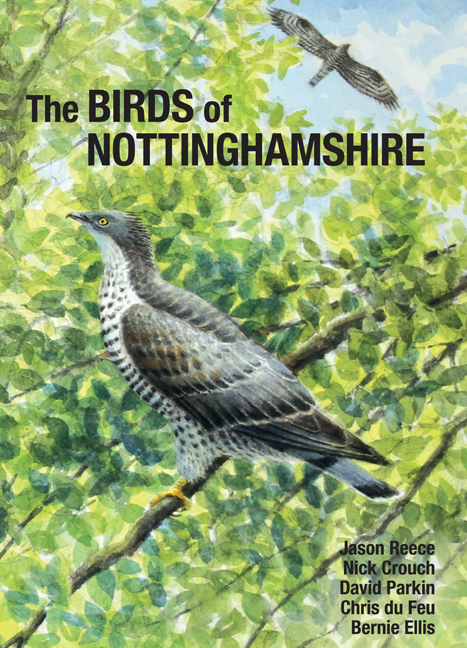Book contents
- Frontmatter
- Contents
- Foreword
- Acknowledgements
- Species sponsorship
- Introduction
- A history of bird recording in Nottinghamshire
- A description of Nottinghamshire and its bird habitats
- Methods
- Species accounts
- Additional Records 2014–2018
- Appendix: Additional and contentious species
- References
- Index
- Miscellaneous Endmatter
Appendix: Additional and contentious species
- Frontmatter
- Contents
- Foreword
- Acknowledgements
- Species sponsorship
- Introduction
- A history of bird recording in Nottinghamshire
- A description of Nottinghamshire and its bird habitats
- Methods
- Species accounts
- Additional Records 2014–2018
- Appendix: Additional and contentious species
- References
- Index
- Miscellaneous Endmatter
Summary
Escapes
Several species that have been recorded in Nottinghamshire as deliberate or accidental releases. The majority of records listed here derive from Annual Reports for Nottinghamshire between 1943 and 2013. Most species have been recorded on a handful of occasions but six (Black Swan, Bar-headed Goose, Muscovy Duck, Wood Duck, Northern Bobwhite and Zebra Finch) have bred in the county on at least one occasion. Perhaps unsurprisingly many of these are wildfowl that have escaped from collections, or popular cage birds such as parrots or finches. There are also several raptors that were presumably lost falconers’ birds. A few, however, are decidedly bizarre, such as the first!
Darwin's (Lesser) Rhea Rhea pennata
One from 29 August 2001 onwards at Kinoulton.
West Indian Whistling Duck Dendrocygna arborea
One was present during November–December 1994, moving between Burton Meadows, Hoveringham and Shelford.
Fulvous Whistling Duck Dendrocygna bicolour
Two reports, both of singletons. One on 11 October 2003 at Cottam Power Station, and another at Hoveringham on 18 October 2003.
Wandering Whistling Duck Dendrocygna arcuata
Two were seen at Lound GP Complex on 20 May 2010.
Red-breasted Goose Branta ruficollis
There are two records, both of single birds. The first was at Hoveringham from 16–31 July 2004, and the second was at Attenborough NR from 22 March–2 April 2005.
Cackling Goose Branta hutchinsii
A small number of birds showing the characteristics of this species (or the smaller races of Canada Goose) were recorded between 1986 and 2007 at Beeston, Clumber Park, Girton and Lound. All records have referred to single birds.
Bar-headed Goose Anser indicus
This species has been recorded quite often since 1969, with regular reports of birds in the Trent and Idle Valleys and at sites in the Dukeries. A single pair bred at the Lound GP Complex in 1994, 1999 and 2000. However, there is little evidence of a consolidation of the feral population in the county and reports have tapered off in recent years, with no reports since 2011.
Emperor Goose Chen canagica
Single birds were reported in the Trent Valley from 1986–1988 and from 1996–2001. A further bird was then reported at Lound GP Complex in October 2003.
- Type
- Chapter
- Information
- The Birds of Nottinghamshire , pp. 576 - 580Publisher: Liverpool University PressPrint publication year: 2019



